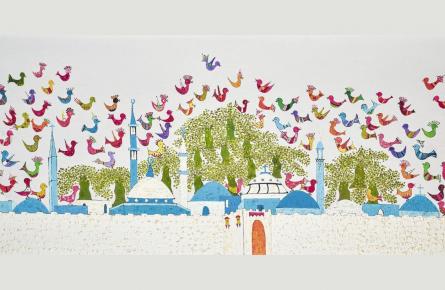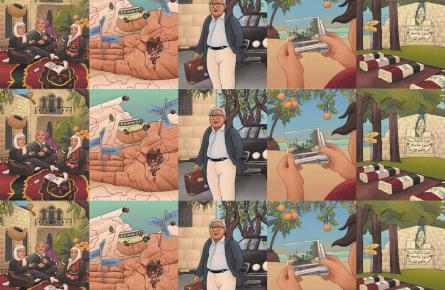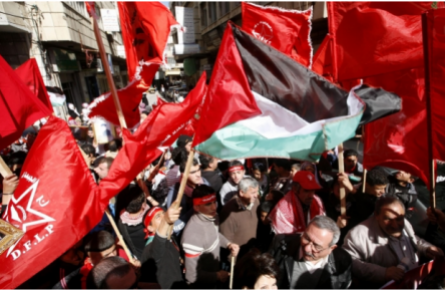Palestine’s national basketball team is dribbling across the world stage with impressive performances in several international competitions. Palestine Square recently sat down with team member Jamal Abu-Shamala – a 6 ft. 5 in. Palestinian-American from Shakopee, Minnesota – to discuss his own personal experience from the American Midwest to playing for Palestine and the team’s significance for Palestinians the world over, and his hopes for the team’s future.
How did a kid growing up in Minnesota wind up on the Palestinian National basketball team?
I grew up in Minnesota my whole life and really got involved with basketball when I was about 10 years old. It became my passion and I always wanted to play at the highest level I could. I grew up watching the University of Minnesota, the only Division 1 team in the state. And I really wanted to play for them. When I was in high school we won the state championship and I was presented with the opportunity to walk-on the University of Minnesota’s team. I ended up playing and earning some good playing time.

Then, towards the end of my sophomore year, I started getting some emails and calls from the Jordanian basketball federation saying they wanted me to play on the Jordanian National Team. They had apparently spotted me on ESPN when my team was playing a nationally televised game and noticed I had a Palestinian name so they reached out to me. Long story short, I ended up going to play for Jordan (all the while not knowing that Palestine had a national team) for two summers.
Then in one tournament we played Palestine and that was the first I had become aware of their team. I felt like I should have been on that team the moment I found out, but was committed to Jordan at that time. Then, after my second summer in Jordan, I was unable to obtain a Jordanian passport for some unknown reason and I went back home to Minnesota. Afterwards, I got a call from my now current teammate Sani Sakakini trying to convince me to play for Palestine, since I am actually Palestinian. I ended up playing my first tournament with Palestine in the Arab Games in Doha in December 2011. I was very proud the first time I played with Palestine and now that we’ve had some success I’m even more proud.
What your family’s connection to Palestine and how do you keep traditions alive in America?
My father is from Gaza and my mother is American born and raised. My father arrived in the U.S. when he was twenty-one years old and has never been back to Gaza. I was given the opportunity through my former job to go to Gaza on a medical mission trip a couple years ago with an organization called the Palestinian Childrens’ Relief Fund to perform surgeries on children in need. It was the first and only time I have been to Gaza and it was an amazing experience both personally and professionally. I met many relatives on my fathers side of the family and was able to connect so many pieces of my background. My father is a very proud Palestinian and being the only member of his family to make it to the states, it has been difficult to keep many traditions alive here in America. My father cooks many Palestinian food dishes and always relating stories to my sisters and I about what life was like when he was in Gaza. He has passed along many Palestinian values and has tried to encourage me to learn about the history of my people.
When you joined the team, did you feel a sense of national brotherhood?
The past four years playing with the Palestinian National Team has been one of the most fulfilling experiences of my life. All of the players on the team were extremely welcoming of me and curious as to what my life was like in America along with my background. I was curious about them as well so we immediately meshed as a team.
From the first time I played with Palestine, I immediately connected with my teammates even though we come from such different places. I look at each and every one of those guys as my brother and would be willing to help any of them if they needed anything. I have had bad relations with teammates in the past on various basketball teams, but I have yet to come across a bad teammate while playing for Palestine.
Where are most of our teammates from?
Most of the guys speak great English and the others speak some, but we are all able to communicate well. I don’t speak much Arabic, but I am taking classes and trying to learn it. Most of the players are from various cities in the West Bank and there have been a few guys that have played with the team over the years from Gaza. In recent tournaments it has been only players from the West Bank and a couple of guys like myself who come from the diaspora. Because of the recent war in Gaza and the border closing by Egypt, the guys from Gaza have not been able to leave Gaza for tournaments since 2014. That has been one of the hardest things for me to see because there are great players in Gaza that could help our team; but unfortunately due to political issues, they are unable to.
Are most of the athletes aware of the political significance of such a team?
I don’t think that many of the guys were aware of the political significance of performing well on an international stage, but a few of us talked about it when we started to have a little success earlier this summer. I have always viewed sports as a means to do good things, especially in Palestine where there may not necessarily be a lot of positives things to cling to. It was amazing to do so well with so little preparation and lack of resources. I have had Palestinian youth around the world contacting me about how they have joined the Palestinian National Team, and that in itself is satisfying to me because of what we have accomplished in encouraging young Palestinians living abroad, like myself, to go back to their homeland and proudly represent their country.
What are your hopes for the team?
I really hope that we can continue to build on the success that we have had as of late. The guys in Palestine have worked so hard to become better players over the last couple years and things have started to come together. We accomplished some good things in the Asian Championship by finishing in 10th place out of 16 teams in our first appearance in that tournament. Considering the lack of resources and preparation that were given to us, I can only think of what could have been if we had the resources other teams had leading up to the tournament. My first time playing Palestine when I was with the Jordanian National Team in a tournament five years ago, we beat them by 50 points and I remember calling my father after and saying how bad I felt knowing that I should have be on that team instead of Jordan. Now, five years later we played Jordan in China on the biggest basketball stage in Asia and nearly beat them. There is no doubt there have been improvements, but there is still so much room to grow. The team needs qualified coaches, proper funding that is held accountable, better training, and a continued long term focus of where we want to be.

Our coach, American Jerry Steele, volunteered his time the last couple years and helped take the team to new heights due to his hard work and dedication to teaching the young players the right way to do things. Now he might likely out as head coach due to failure to see eye to eye on most issues with the basketball federation and the overall lack of support for his plans. Coach Steele was a great guy for the job and did amazing work, but unfortunately his absence could be a big setback for the team going forward.
What do you hope for the team as a symbol of the Palestinian cause?
I can speak for the whole team when I say that we were all proud to give hope and something to cheer about to so many people back in Palestine. I had family in Gaza sending me messages and saying how excited they all were to see Palestine succeeding in international competitions. There are so many things that can be translated from sports into the “real world” and that is why sports are so important to every society. Coach Steele always stressed how we should always focus on the long term goal of what we wanted to achieve from the moment he entered the team. He talked about how hard the process would be and how long it would take to be able to compete with these other teams, but he kept saying that if we worked hard and continued to take small steps, in the end we would see the result of our work. That is exactly what happened with this team and hopefully people recognized that and can relate that to their everyday lives.
When you play abroad, what has been the reaction from other national teams?
There were many things that stuck out to me from this last tournament but there is one comment that had me thinking. I heard many people from opposing teams and even the coach of the Iranian National Team, who is a German coach that has coached many teams on the highest level of basketball, say that they have never seen a team fight and play with so much heart and passion as the Palestinian National Team. The guys on the team that live in Palestine have to deal with so many roadblocks in their everyday lives. Something as simple as going to practice can take half the day to get there due to the occupation and various checkpoints along the way. When I heard those comments from people at the tournament, I knew that the heart and passion that those guys play with comes from the stresses they have to deal with in their daily lives. Even with that, I don’t hear many complaints, they just continue to persevere.

Is there anything else you’d like to tell our readers about the team?
The majority of the success we had can be attributed to one guy on the team who does so much more than just show up for the games. Sani Sakakini does everything from recruiting players, administrative work, scheduling training, and much more on top of what he has to do to prepare himself for the games. His hard work has secured him a contract in China where he plays in one of the best leagues in the world. Without him this team wouldn’t have achieved half of the success it has had. For me it is easy to show up a couple days before the games, play and then head back home to my job and life, but the guys that go back to Palestine deserve far more credit for the success they’ve had due to all the difficulties they face along the way.
[youtube https://www.youtube.com/watch?v=KAtjpM4dJM0]
Follow Jamal Abu-Shamala on Twitter.
By Khelil Bouarrouj.









